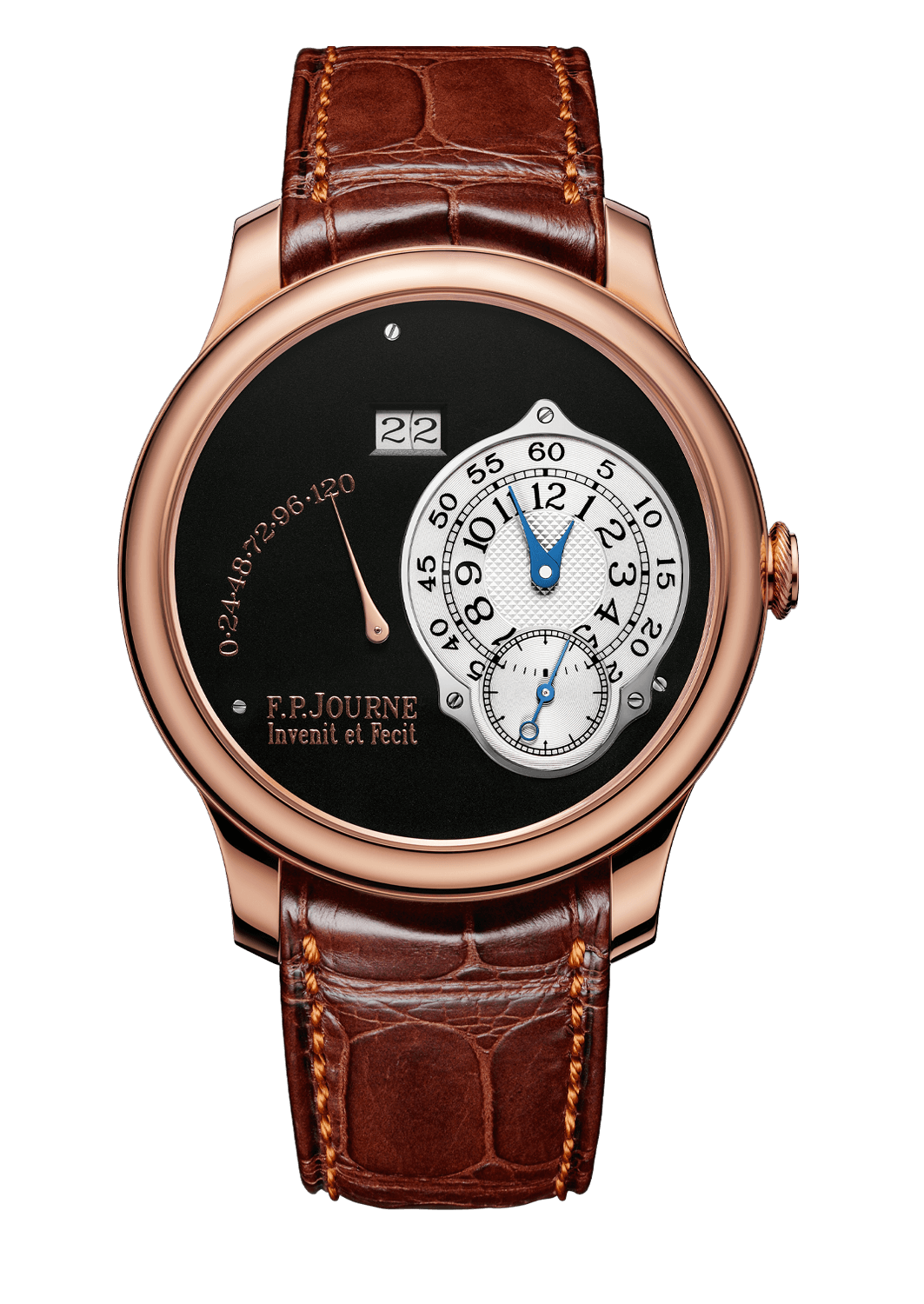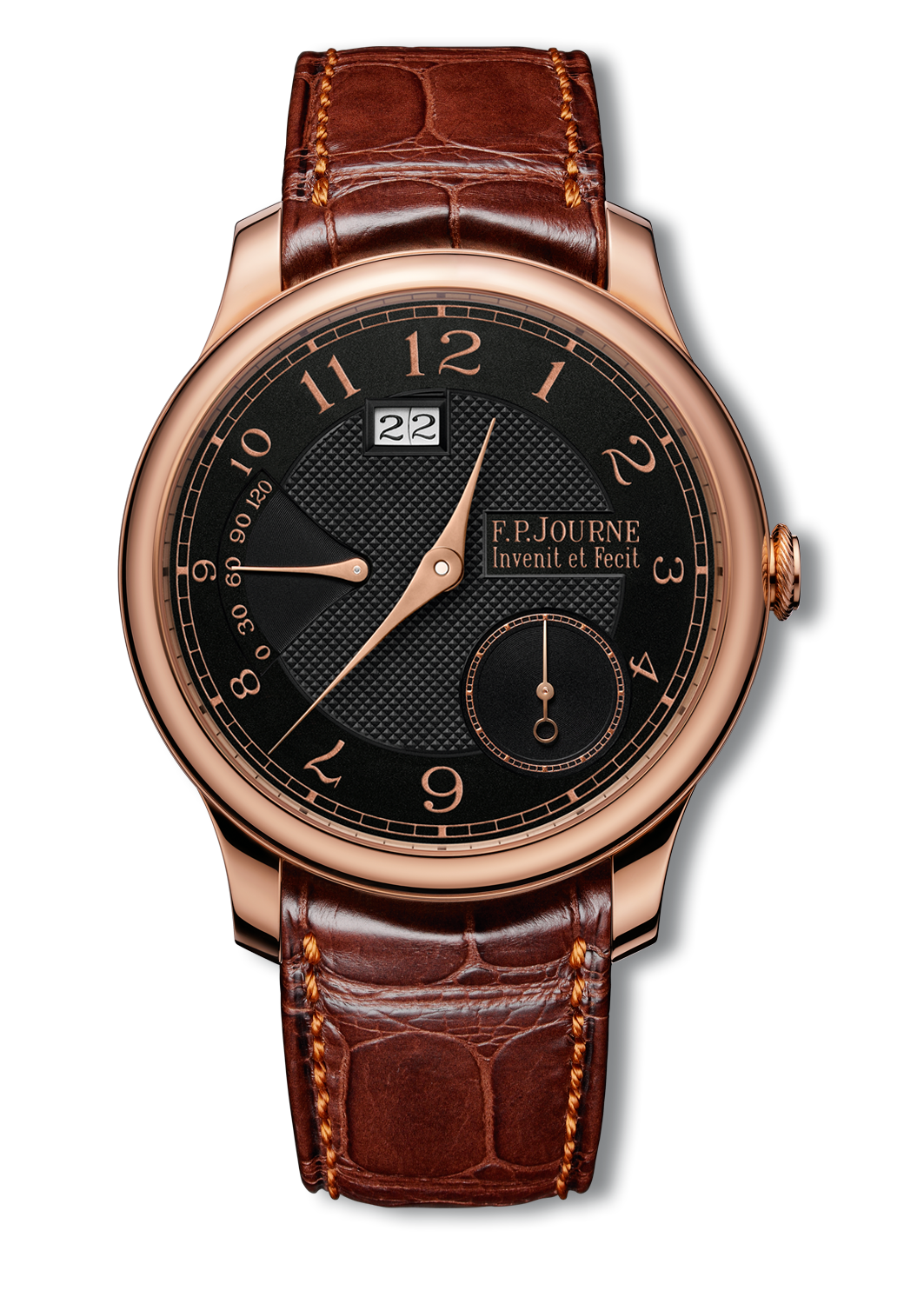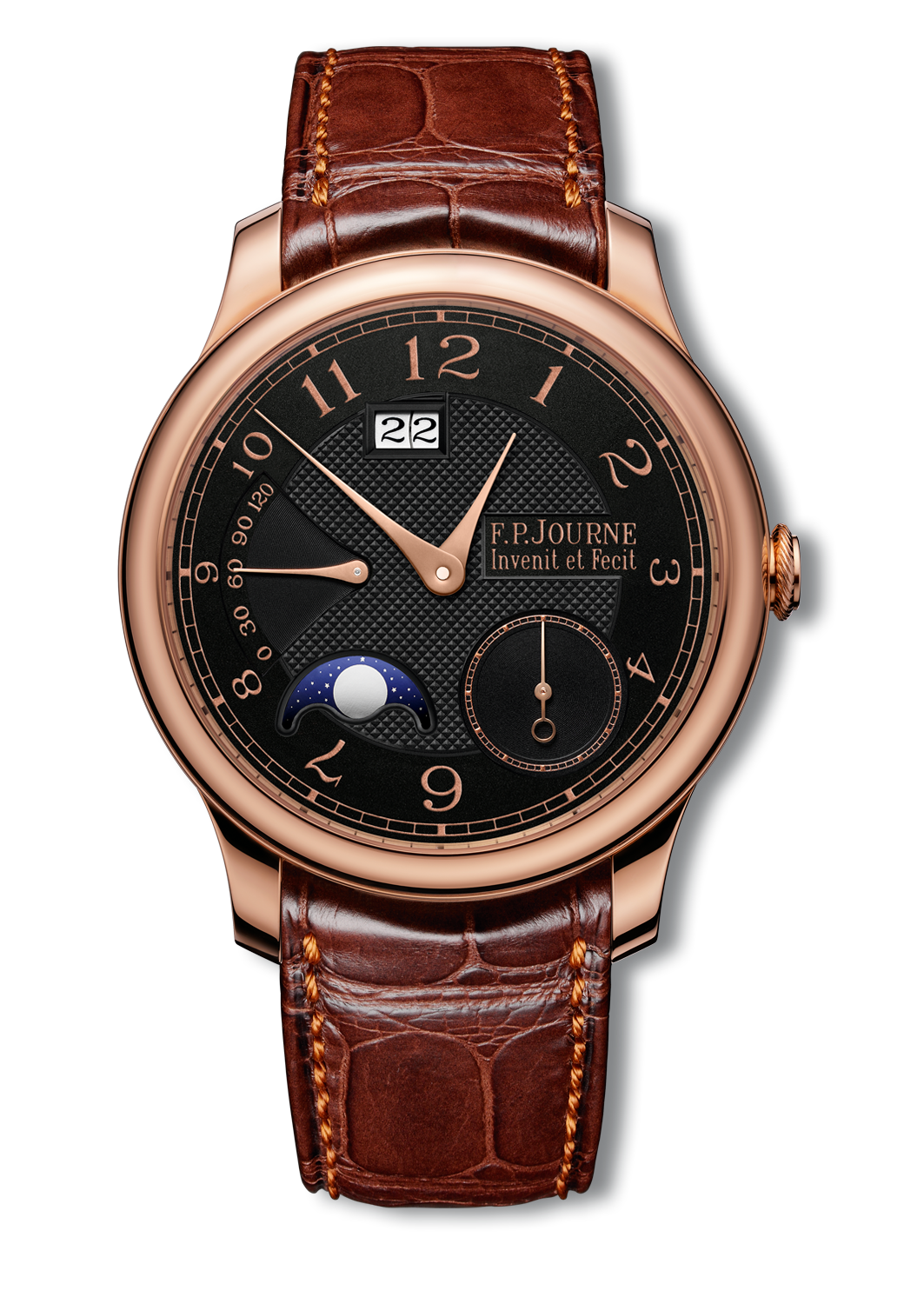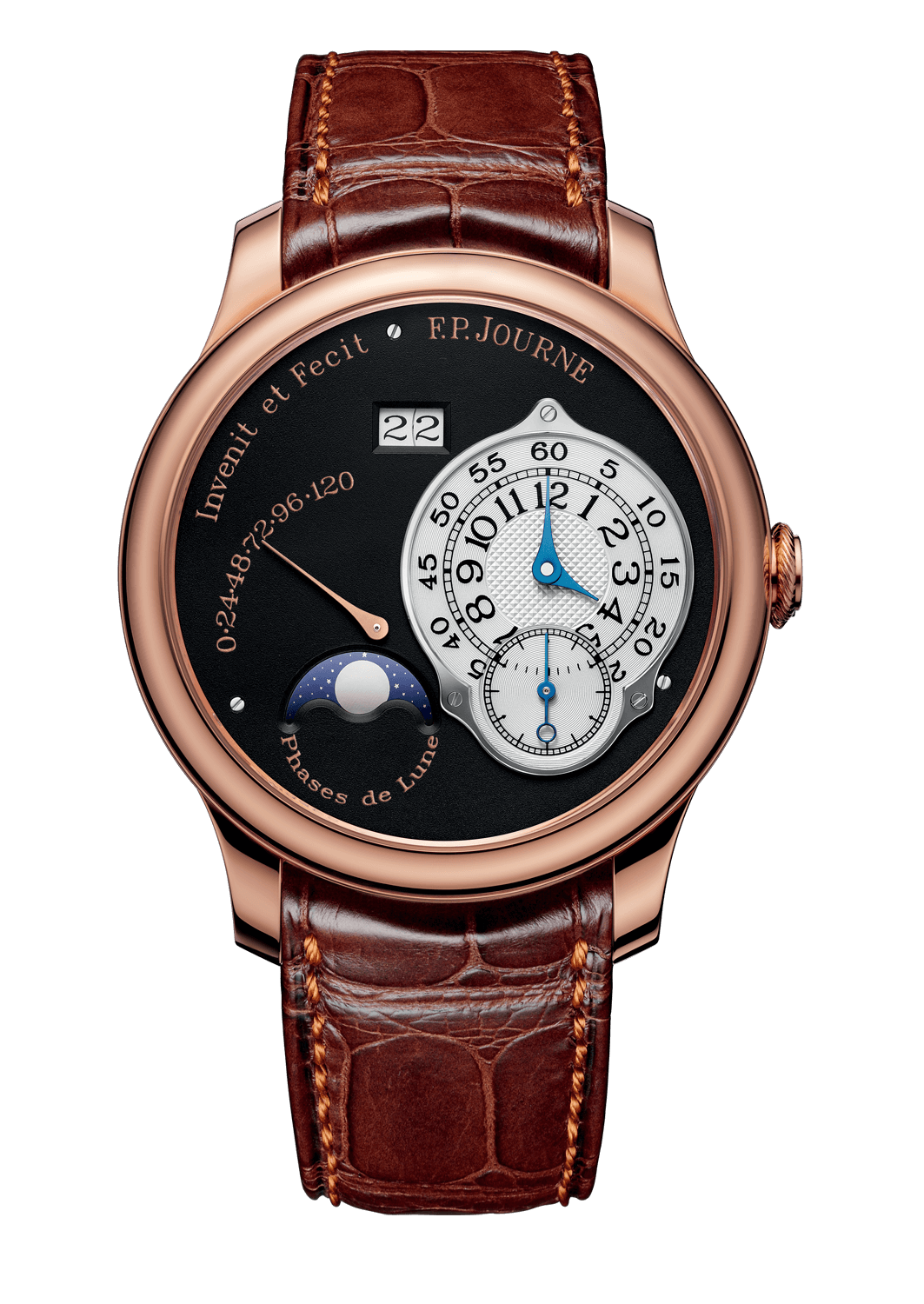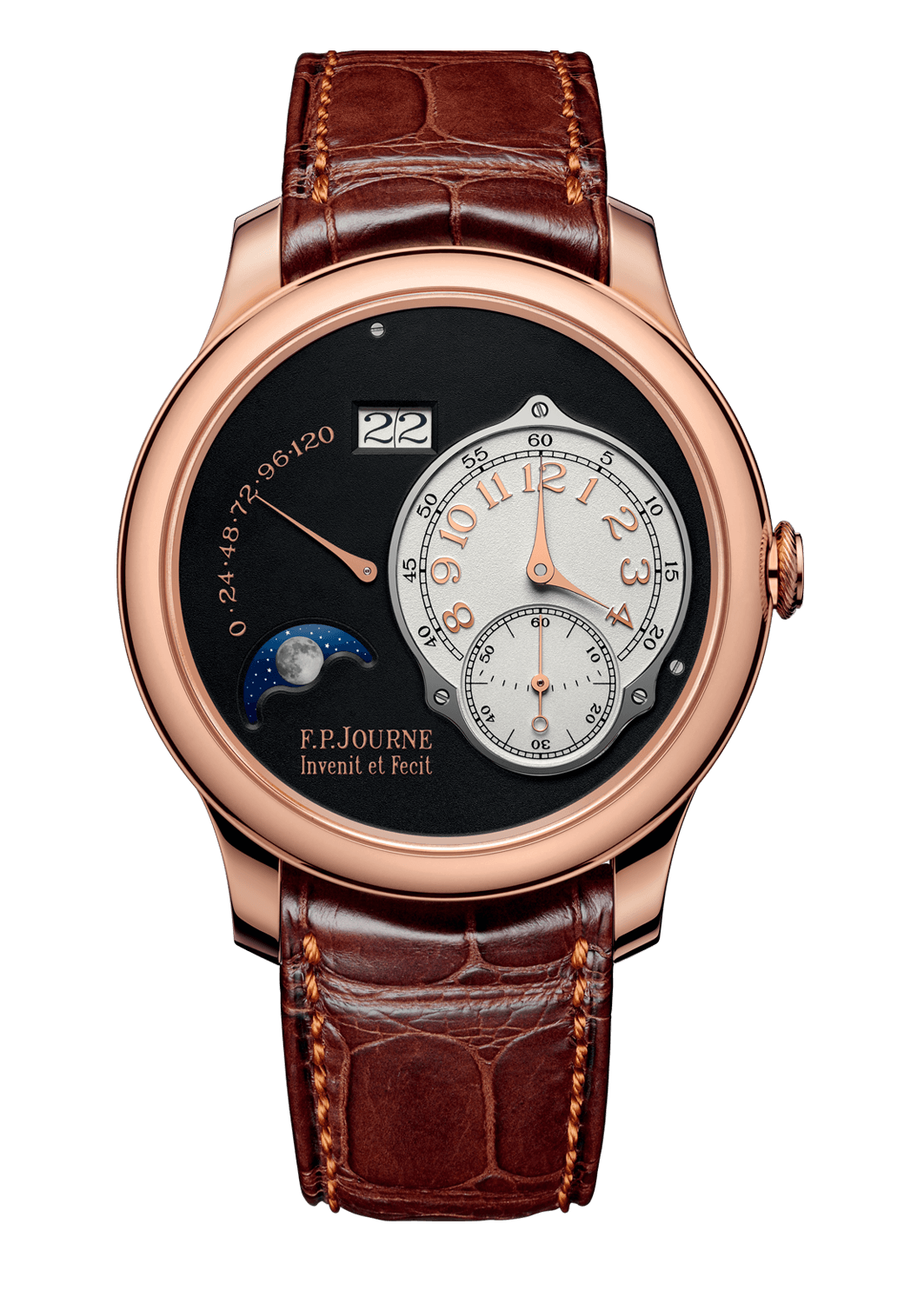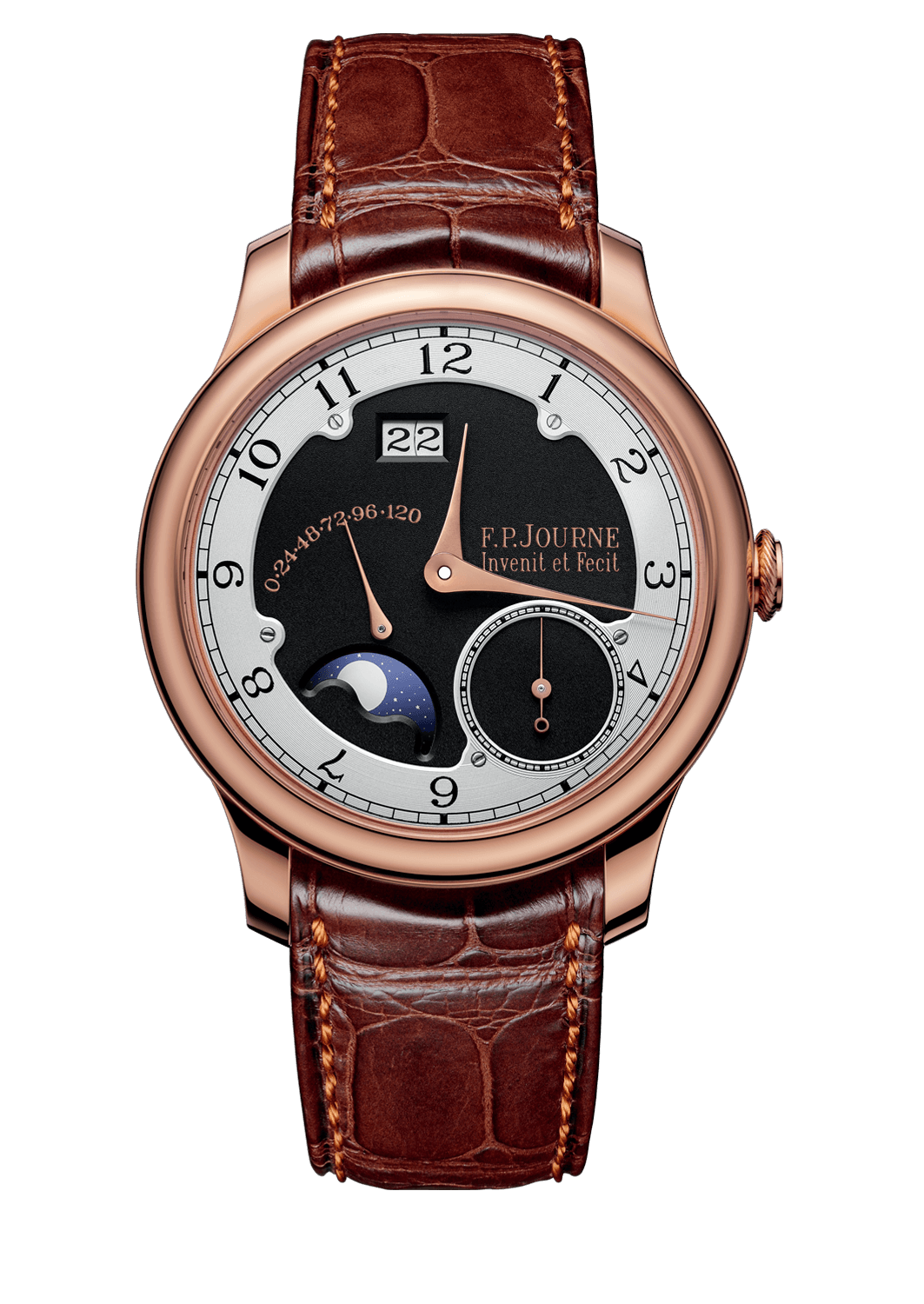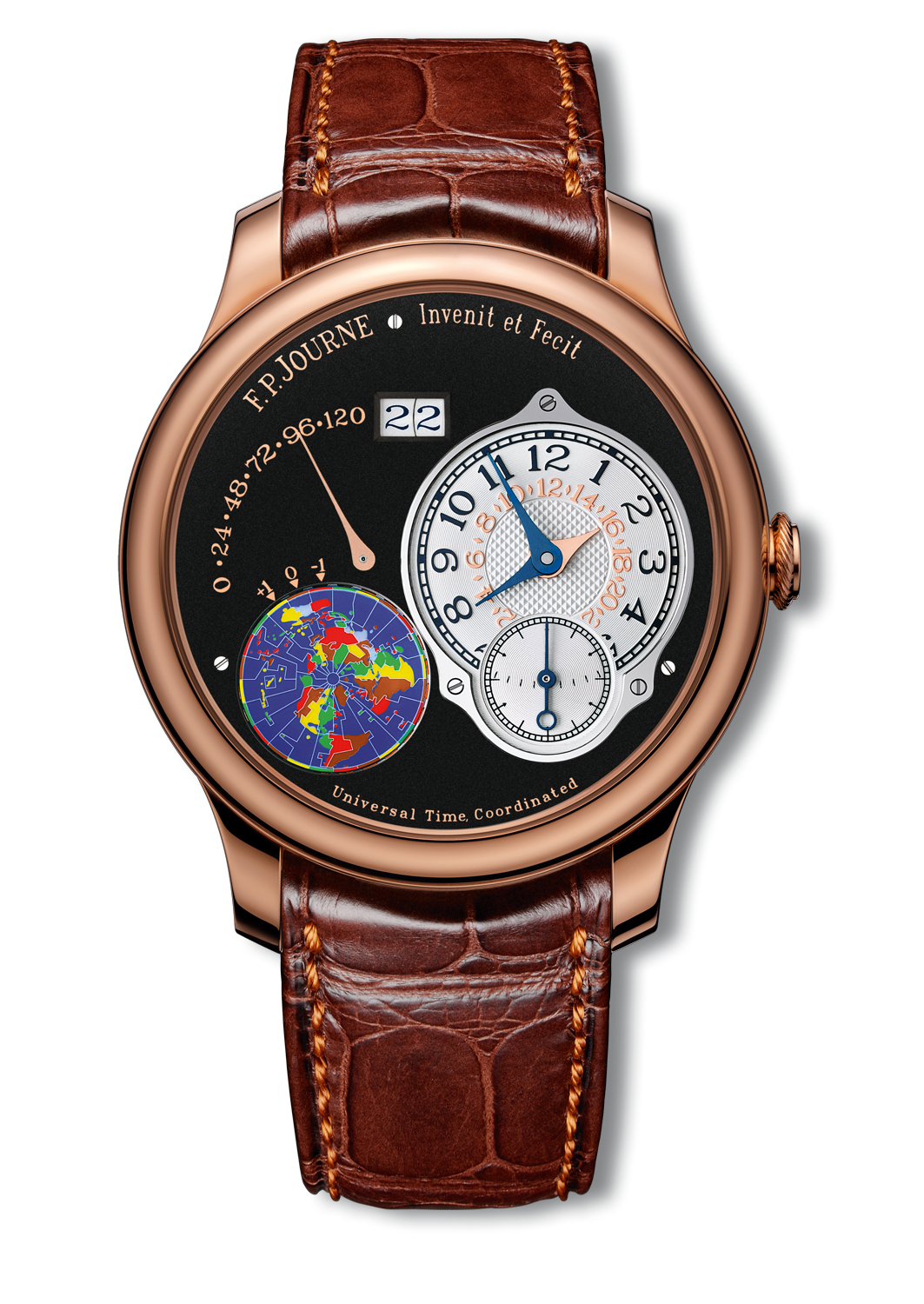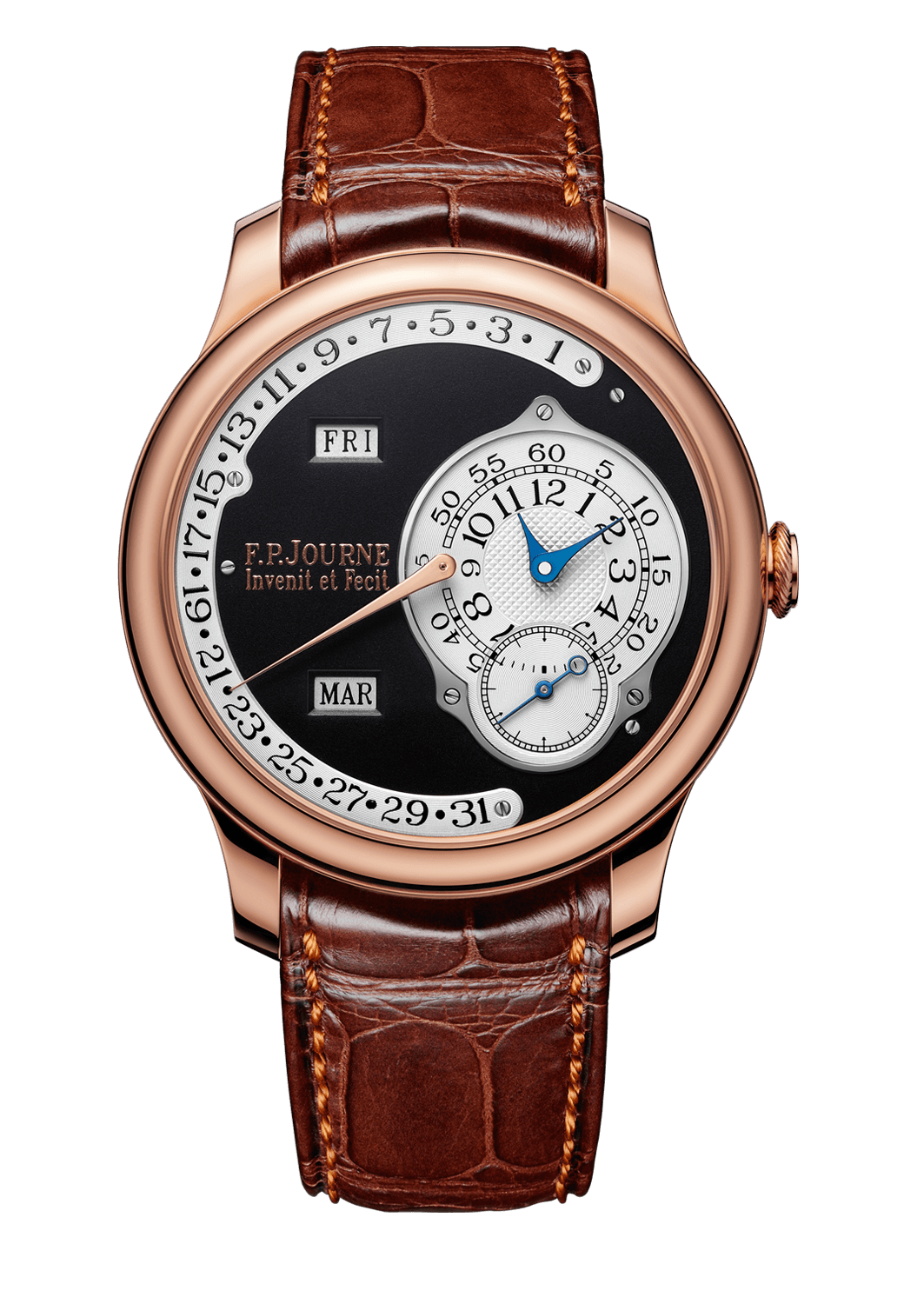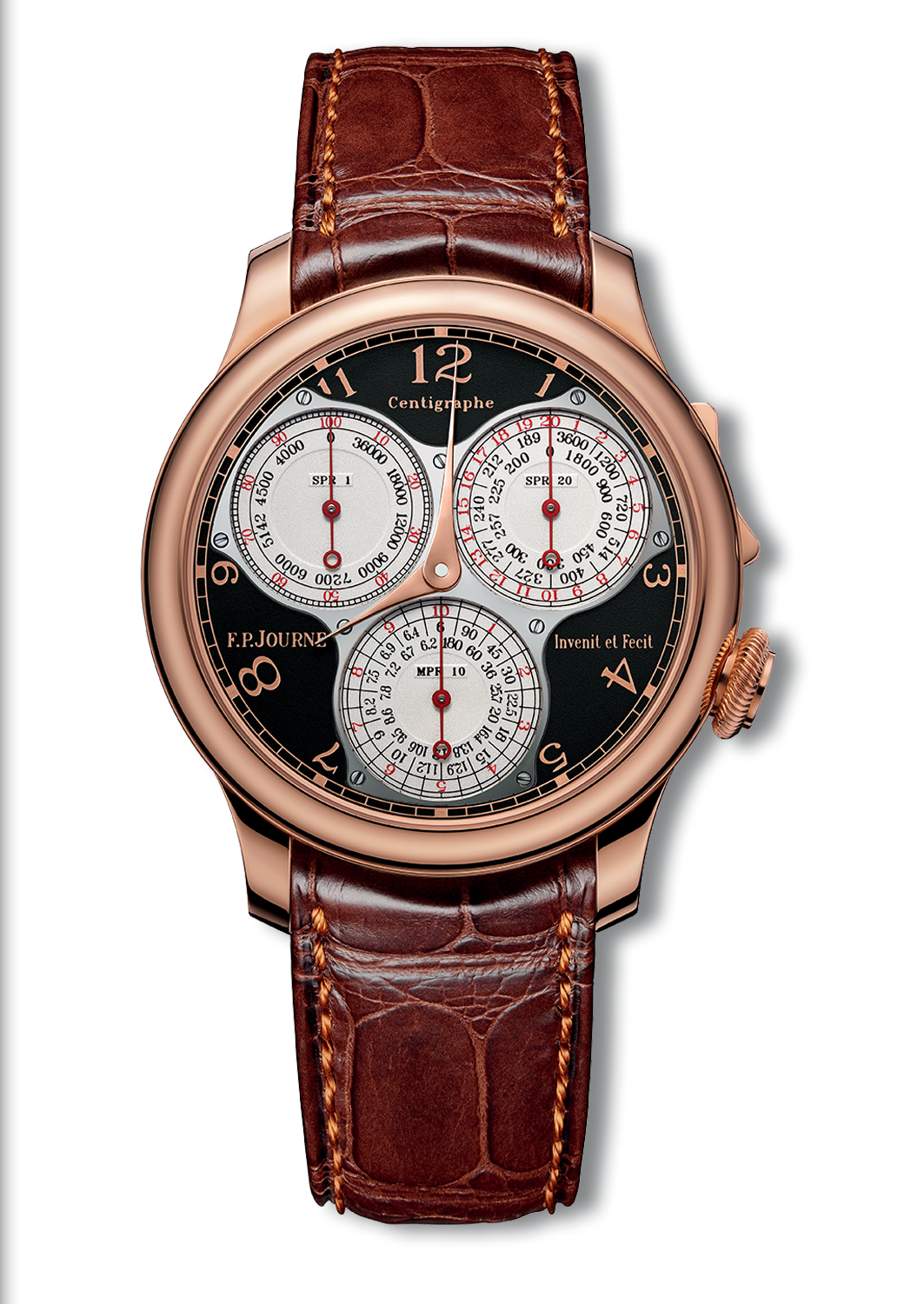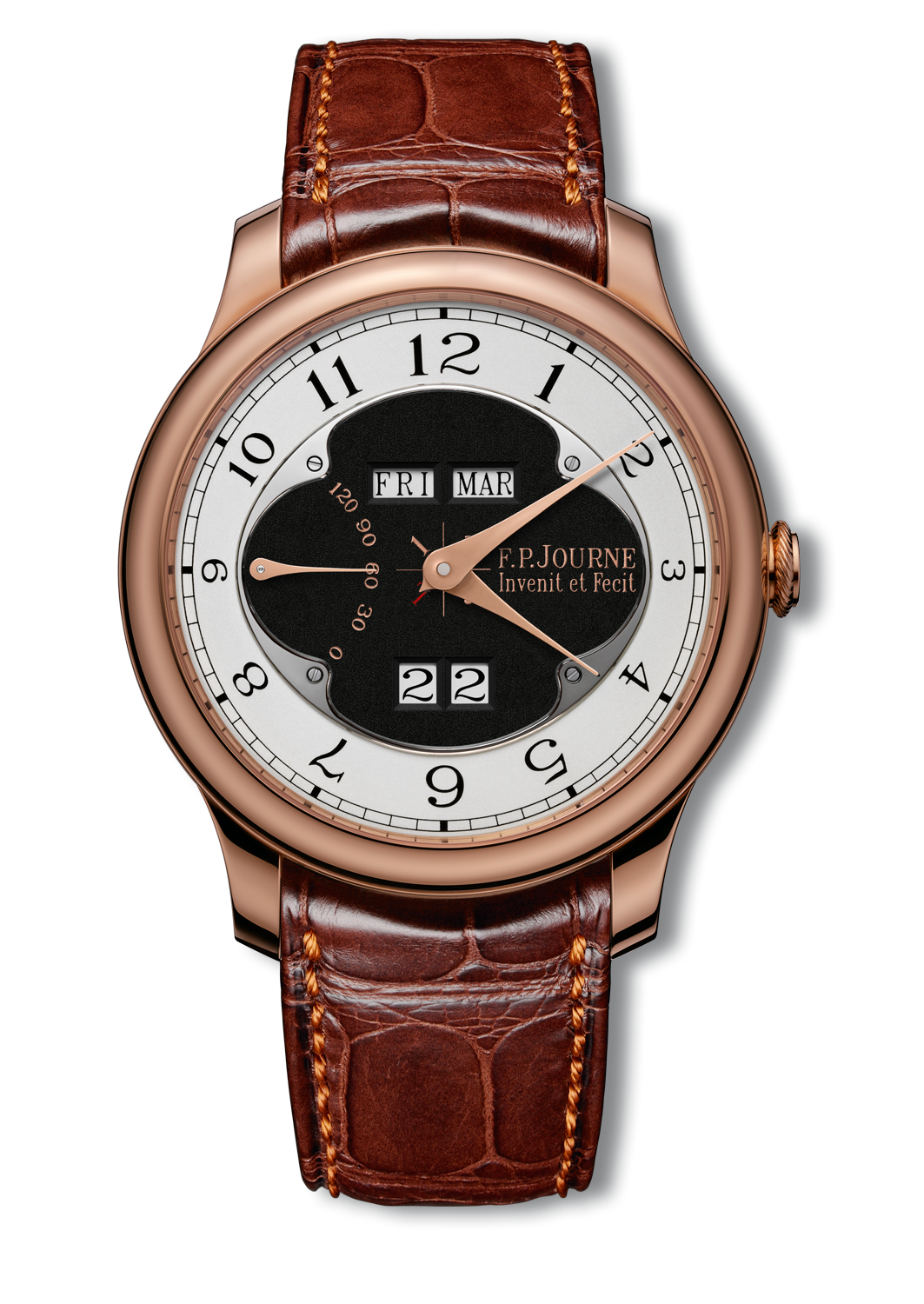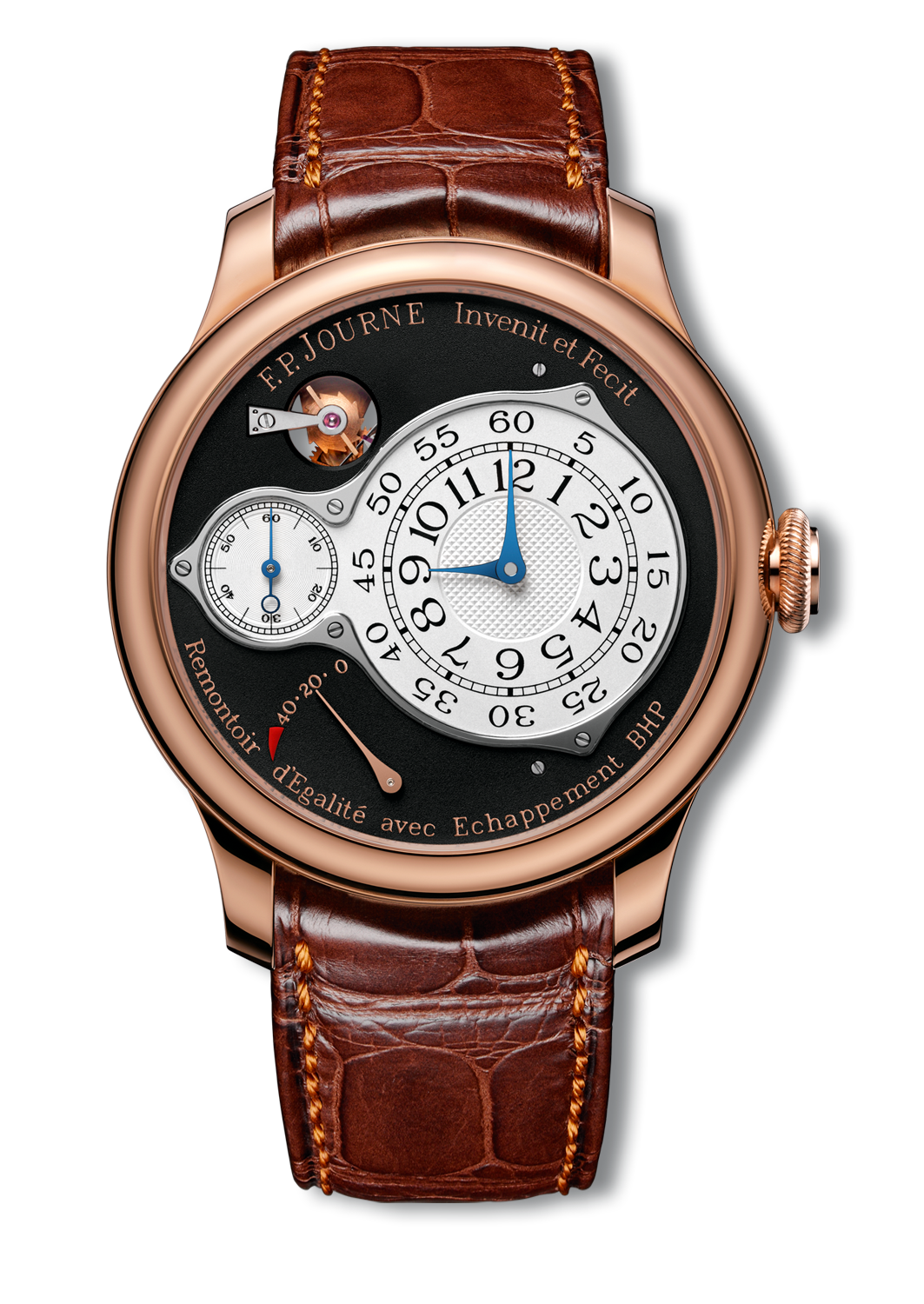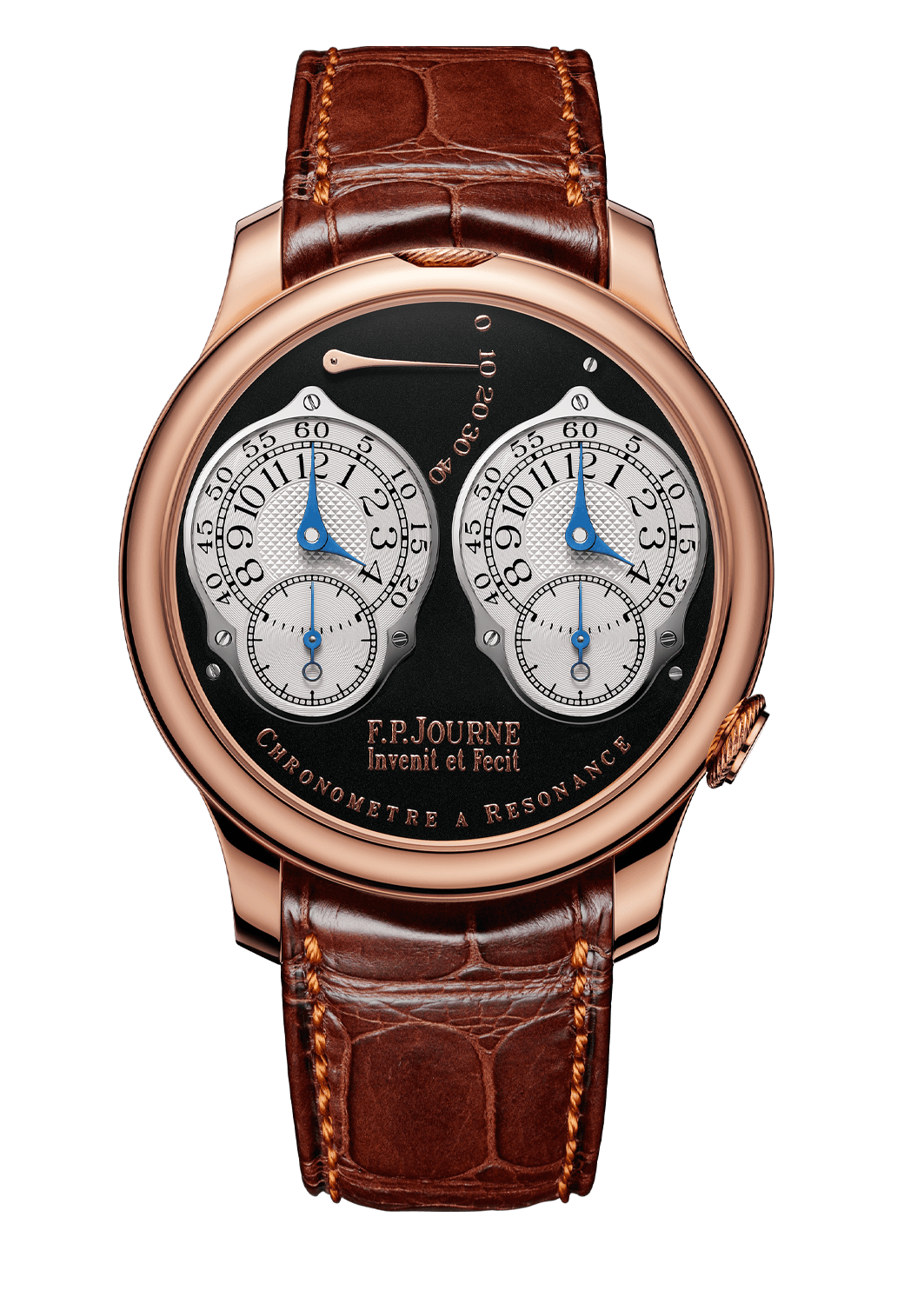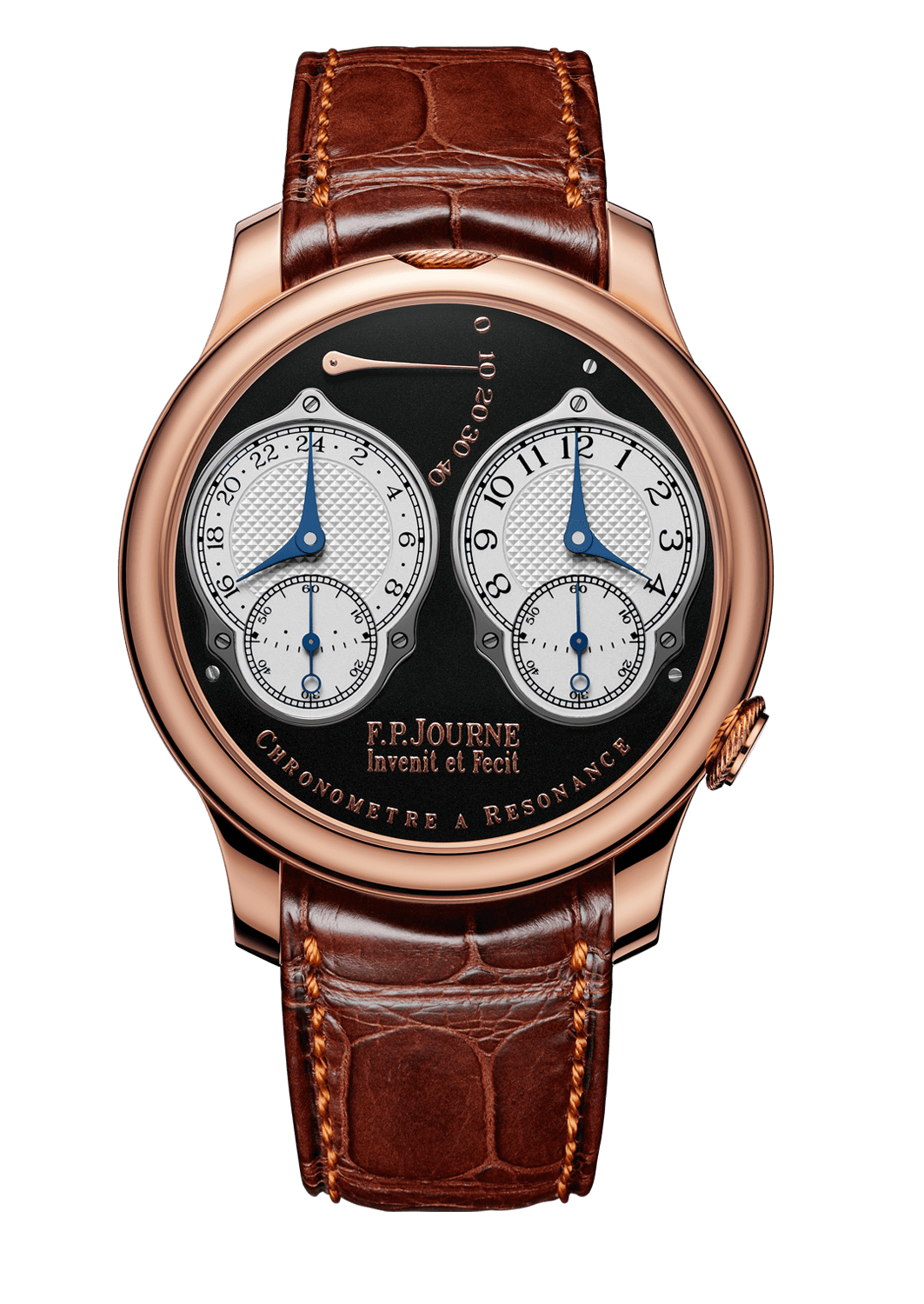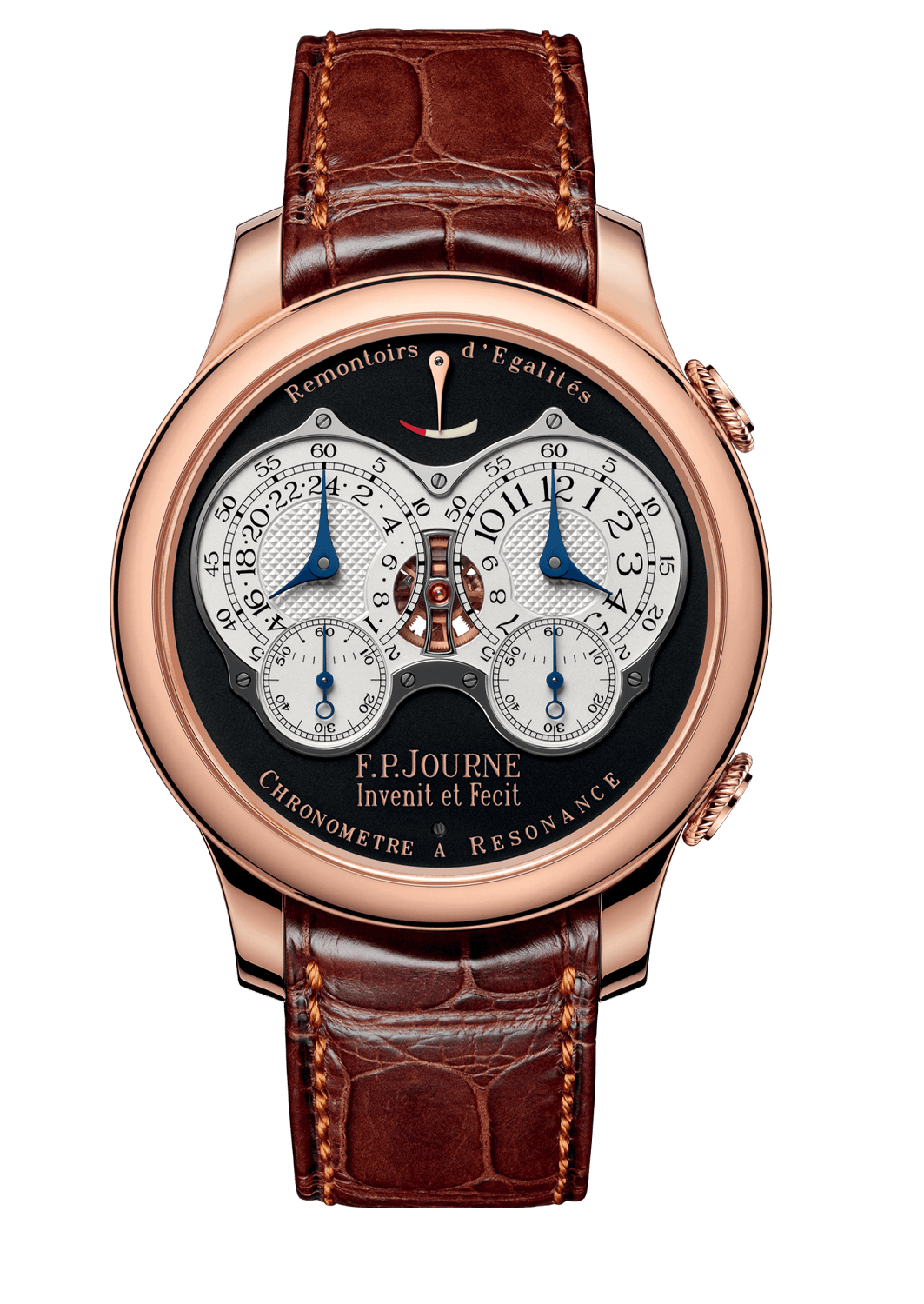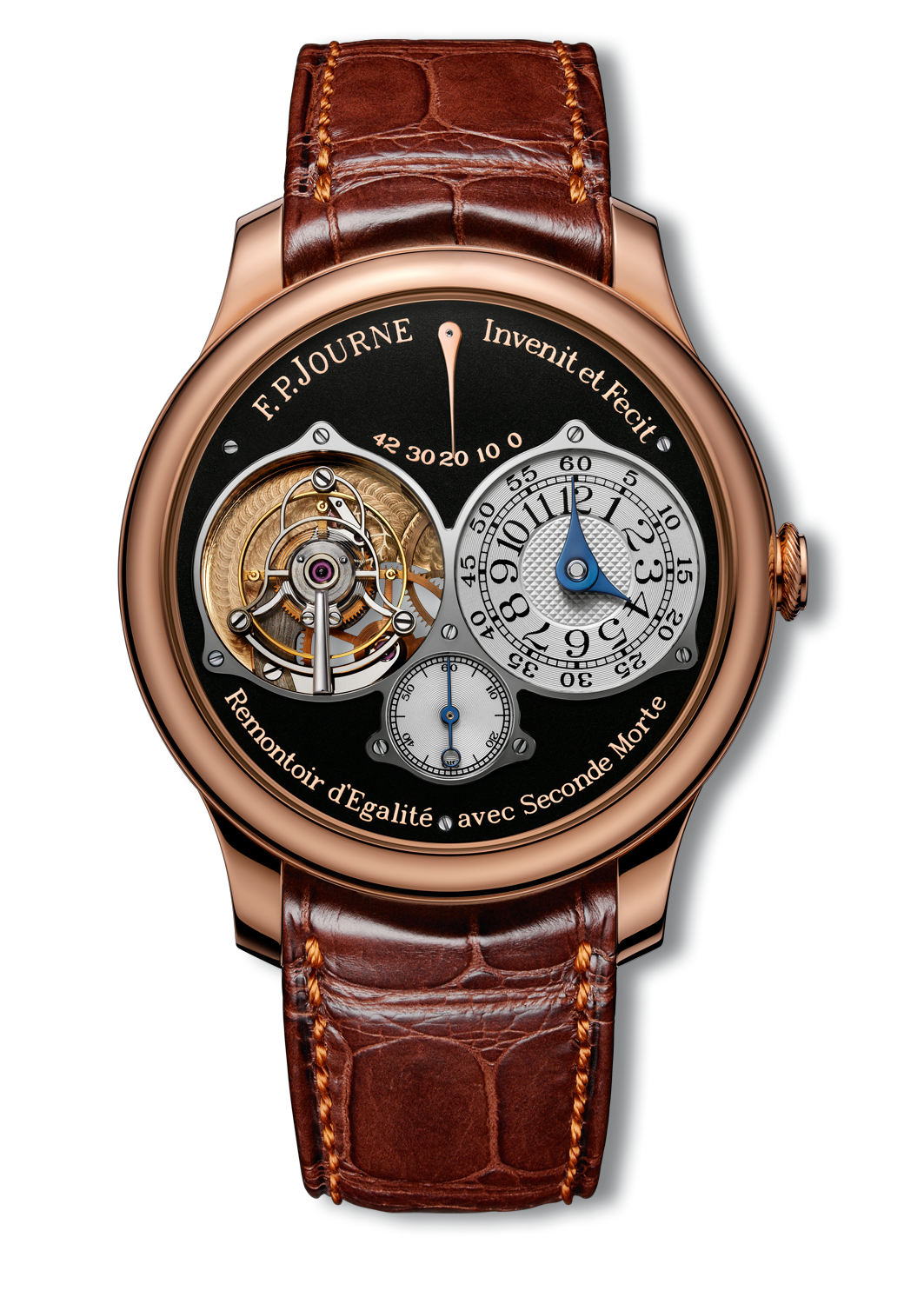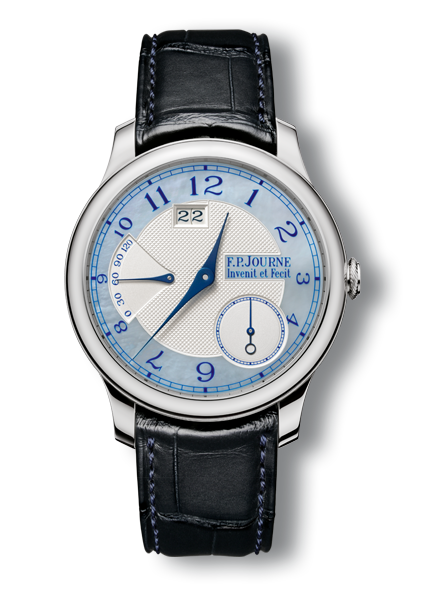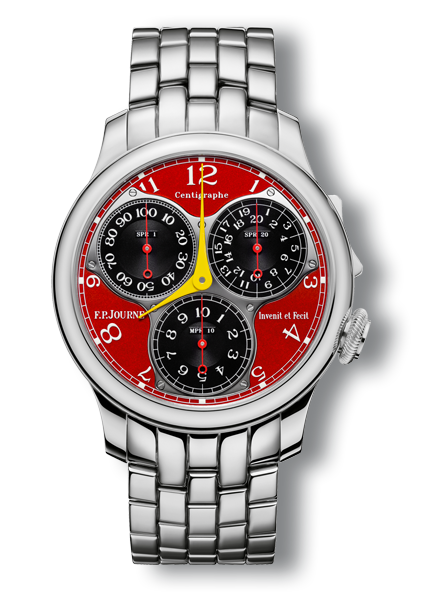Calibre 1300.3 https://www.fpjourne.com/en/collection/boutique-collection/boutique-edition-octa-calendrier FP Journe https://www.fpjourne.com/en FP Journe
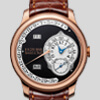
Diameter: 38 ou 40 mm
Overall height: 10.6 mm
Dial: blackened Gold and whitened guilloché Silver
Hands: blued Steel and 5N gilt Steel
Technical Specifications
Off centre hours and minutes
Small seconds at 4:30
Large Central Date
Day in window
Month in window
- Overall diameter : 30.80 mm
- Casing-up diameter : 30.40 mm
- Overall height : 5.80 mm
- Height of winding stem : 2.80 mm
- Diameter of stem thread : S0.90mm
In-line lever escapement, 15-tooth wheel
Balance with 4 inertia weights
Flat Anachron microflamed spring
Mobile stud holder
Free-sprung balance
Nivatronic laser-welded to the collet
Pinned GE stud
Three-position crown
Slipping mainspring
Off-centre winding rotor
of rotor:
274 clockwise revolutions / 24 hours (without mainspring slipping)
Bi-directional automatic winding
Date setting by turning crown in opposite ways (position2)
Time setting with crown in position 3
21'600 Alt/h, 3 Hz
Inertia: 10.10 mgcm2
Angle of lift: 52°
12 h dial up : 280°
90 h dial up : 220°
160 ± 10 hours
39
High grade
Circular stripes on the bridges
Baseplate partly circular grained
Gilt engravings
Polished screw heads with chamfered slots
Pegs with polished rounded ends
Movement: 241
Cased up with strap: 282
Off centre hours and minutes
Small seconds at 4:30
Large Central Date
Day in window
Month in window
- Overall diameter : 30.80 mm
- Casing-up diameter : 30.40 mm
- Overall height : 5.80 mm
- Height of winding stem : 2.80 mm
- Diameter of stem thread : S0.90mm
In-line lever escapement, 15-tooth wheel
Balance with 4 inertia weights
Flat Anachron microflamed spring
Mobile stud holder
Free-sprung balance
Nivatronic laser-welded to the collet
Pinned GE stud
Three-position crown
Slipping mainspring
Off-centre winding rotor
of rotor:
274 clockwise revolutions / 24 hours (without mainspring slipping)
Bi-directional automatic winding
Date setting by turning crown in opposite ways (position2)
Time setting with crown in position 3
21'600 Alt/h, 3 Hz
Inertia: 10.10 mgcm2
Angle of lift: 52°
12 h dial up : 280°
90 h dial up : 220°
160 ± 10 hours
39
High grade
Circular stripes on the bridges
Baseplate partly circular grained
Gilt engravings
Polished screw heads with chamfered slots
Pegs with polished rounded ends
Movement: 241
Cased up with strap: 282

Technical description
Watches with long power reserves have hitherto been handicapped by small balances which are susceptible to shocks and disturbances. The Octa's compact construction allows a large (10.1 mm) balance to be fitted, giving greater inertia and stability. The free-sprung chronometer balance is adjusted by five turning weights that vibrate at a steady 21'600 times an hour.
Fully wound, the Octa delivers chronometric precision for 120 hours. The meter-long mainspring supplies an average 850gr of torque, limiting the loss in balance amplitude to 25% over the five-day period. Beyond that time, the watch will continue to go for another day or two, but the amplitude-loss no longer guarantees precision timekeeping.

Technical description
Watches with long power reserves have hitherto been handicapped by small balances which are susceptible to shocks and disturbances. The Octa's compact construction allows a large (10.1 mm) balance to be fitted, giving greater inertia and stability. The free-sprung chronometer balance is adjusted by five turning weights that vibrate at a steady 21'600 times an hour.
Fully wound, the Octa delivers chronometric precision for 120 hours. The meter-long mainspring supplies an average 850gr of torque, limiting the loss in balance amplitude to 25% over the five-day period. Beyond that time, the watch will continue to go for another day or two, but the amplitude-loss no longer guarantees precision timekeeping.
Diameter: 38 ou 40 mm
Overall height: 10.6 mm
Dial: blackened Gold and whitened guilloché Silver
Hands: blued Steel and 5N gilt Steel

Diameter: 38 ou 40 mm
Overall height: 10.6 mm
Dial: blackened Gold and whitened guilloché Silver
Hands: blued Steel and 5N gilt Steel
Technical Specifications
Off centre hours and minutes
Small seconds at 4:30
Large Central Date
Day in window
Month in window
- Overall diameter : 30.80 mm
- Casing-up diameter : 30.40 mm
- Overall height : 5.80 mm
- Height of winding stem : 2.80 mm
- Diameter of stem thread : S0.90mm
In-line lever escapement, 15-tooth wheel
Balance with 4 inertia weights
Flat Anachron microflamed spring
Mobile stud holder
Free-sprung balance
Nivatronic laser-welded to the collet
Pinned GE stud
Three-position crown
Slipping mainspring
Off-centre winding rotor
of rotor:
274 clockwise revolutions / 24 hours (without mainspring slipping)
Bi-directional automatic winding
Date setting by turning crown in opposite ways (position2)
Time setting with crown in position 3
21'600 Alt/h, 3 Hz
Inertia: 10.10 mgcm2
Angle of lift: 52°
12 h dial up : 280°
90 h dial up : 220°
160 ± 10 hours
39
High grade
Circular stripes on the bridges
Baseplate partly circular grained
Gilt engravings
Polished screw heads with chamfered slots
Pegs with polished rounded ends
Movement: 241
Cased up with strap: 282
Off centre hours and minutes
Small seconds at 4:30
Large Central Date
Day in window
Month in window
- Overall diameter : 30.80 mm
- Casing-up diameter : 30.40 mm
- Overall height : 5.80 mm
- Height of winding stem : 2.80 mm
- Diameter of stem thread : S0.90mm
In-line lever escapement, 15-tooth wheel
Balance with 4 inertia weights
Flat Anachron microflamed spring
Mobile stud holder
Free-sprung balance
Nivatronic laser-welded to the collet
Pinned GE stud
Three-position crown
Slipping mainspring
Off-centre winding rotor
of rotor:
274 clockwise revolutions / 24 hours (without mainspring slipping)
Bi-directional automatic winding
Date setting by turning crown in opposite ways (position2)
Time setting with crown in position 3
21'600 Alt/h, 3 Hz
Inertia: 10.10 mgcm2
Angle of lift: 52°
12 h dial up : 280°
90 h dial up : 220°
160 ± 10 hours
39
High grade
Circular stripes on the bridges
Baseplate partly circular grained
Gilt engravings
Polished screw heads with chamfered slots
Pegs with polished rounded ends
Movement: 241
Cased up with strap: 282

Technical description
Watches with long power reserves have hitherto been handicapped by small balances which are susceptible to shocks and disturbances. The Octa's compact construction allows a large (10.1 mm) balance to be fitted, giving greater inertia and stability. The free-sprung chronometer balance is adjusted by five turning weights that vibrate at a steady 21'600 times an hour.
Fully wound, the Octa delivers chronometric precision for 120 hours. The meter-long mainspring supplies an average 850gr of torque, limiting the loss in balance amplitude to 25% over the five-day period. Beyond that time, the watch will continue to go for another day or two, but the amplitude-loss no longer guarantees precision timekeeping.

Technical description
Watches with long power reserves have hitherto been handicapped by small balances which are susceptible to shocks and disturbances. The Octa's compact construction allows a large (10.1 mm) balance to be fitted, giving greater inertia and stability. The free-sprung chronometer balance is adjusted by five turning weights that vibrate at a steady 21'600 times an hour.
Fully wound, the Octa delivers chronometric precision for 120 hours. The meter-long mainspring supplies an average 850gr of torque, limiting the loss in balance amplitude to 25% over the five-day period. Beyond that time, the watch will continue to go for another day or two, but the amplitude-loss no longer guarantees precision timekeeping.
About
THE BOUTIQUE EDITION WITH BLACK DIAL ON 18K 6N GOLD CASE IS AVAILABLE ONLY IN THE F.P.JOURNE BOUTIQUES AND ESPACES AND FOR ALL F.P.JOURNE MODELS, APART FROM THE STRIKING WATCHES.
WORLD PREMIERE:
THE OCTA CALENDRIER IS THE FIRST WRISTWATCH INTEGRATE AN ANNUAL CALENDAR WITH A LARGE DATE, AND TO FEATURE A POWER RESERVE OF MORE THAN 120 HOURS.
THE ANNUAL CALENDAR IS THE THIRD COMPLICATION TO BE INTEGRATED IN THE AUTOMATIC OCTA CALIBRE. A CALIBRE RECOGNIZED AS THE AUTOMATIC MOVEMENT TO FEATURE A POWER RESERVE OF OVER FIVE DAYS WITH A VERY HIGH DEGREE OF PRECISION - EVEN WHEN THE WATCH IS NOT WORN! THE ORIGINALITY OF EACH COMPLICATION IN THE OCTA COLLECTION IS THE IDENTICAL BASEPLATE USED FOR EACH MODEL.
FRANÇOIS-PAUL JOURNE HAS MANAGED TO INTEGRATE A SIZABLE COMPLICATION - A RETROGRADE ANNUAL CALENDAR - WHILE MAINTAINING THE DIMENSIONS OF THE STANDARD MOVEMENT OF ONLY 30MM IN DIAMETER AND 5,7 MM HIGH.
THE ANNUAL CALENDAR INDICATES THE DATE IN TWO WINDOWS AND IT THE DATE ADVANCES AUTOMATICALLY FOR MONTHS WITH 29, 30 AND 31 DAYS. IN NON-LEAP YEARS (THREE YEARS OUT OF FOUR) THE DATE IS ADVANCED MANUALLY FROM THE 28TH TO THE 29TH OF FEBRUARY BY A SIMPLE TURN OF THE CROWN. THE DATE THEN PASSES AUTOMATICALLY FROM FEBRUARY 29 TO MARCH 1.
A horological ideal
“The construction of the Octa calibre has less powerful ties with horological history than do the constant-force device or resonance models, but it symbolises an horological ideal of giving timekeepers the highest possible degree of precision and autonomy!
One can indeed note the fact that if church clocks are placed so high, in addition to enhancing visibility, it was mostly because it often took an entire month for the driving-weights to drop the length of their cords. Numerous systems were invented to increase the operating duration of timekeeping devices, meeting with various degrees of success. Given the small volume of a wristwatch, the size of the mainspring was automatically limited. Watchmakers therefore discovered the trick of adding an extra wheel to the customary geartrain in order to extend the duration of its development. Unfortunately, actually using this system, even with a stronger spring, led them to observe that the level of energy actually reaching the balance remained low. To compensate for this, they fitted a smaller balance using less energy, but which was also less stable. It is therefore not unusual to find that some watches able to run for several days display an extremely unpredictable level of precision.
This challenge was a powerful source of motivation! I then imagined that the best and the most obvious means of extending the running duration would be to extend the capacity of the spring development. The difficulty lay in integrating it on the same level as the gear-train and the escapement, given its stability: 1 metre and 1 millimetre thick. Thanks to the low torque of this spring, I could achieve extremely fast automatic winding (one and a half hours on a Chappuis cyclotest for over 5 days’ running).
Once the challenge of autonomy was thus successfully met with this automatic winding calibre, I knuckled down to the second challenge of managing to insert various complications into that same movement: power reserve with large date display, fly-back chronograph with large date display, retrograde annual calendar, etc… and of doing so while maintaining an identical size for all models in the Octa collection.
Three years of research and development were required before this automatic winding movement that is unique in the world could be presented to the public.”
François-Paul Journe
Technical Specifications
Off centre hours and minutes
Small seconds at 4:30
Large Central Date
Day in window
Month in window
- Overall diameter : 30.80 mm
- Casing-up diameter : 30.40 mm
- Overall height : 5.80 mm
- Height of winding stem : 2.80 mm
- Diameter of stem thread : S0.90mm
In-line lever escapement, 15-tooth wheel
Balance with 4 inertia weights
Flat Anachron microflamed spring
Mobile stud holder
Free-sprung balance
Nivatronic laser-welded to the collet
Pinned GE stud
Three-position crown
Slipping mainspring
Off-centre winding rotor
of rotor:
274 clockwise revolutions / 24 hours (without mainspring slipping)
Bi-directional automatic winding
Date setting by turning crown in opposite ways (position2)
Time setting with crown in position 3
21'600 Alt/h, 3 Hz
Inertia: 10.10 mgcm2
Angle of lift: 52°
12 h dial up : 280°
90 h dial up : 220°
160 ± 10 hours
39
High grade
Circular stripes on the bridges
Baseplate partly circular grained
Gilt engravings
Polished screw heads with chamfered slots
Pegs with polished rounded ends
Movement: 241
Cased up with strap: 282
Off centre hours and minutes
Small seconds at 4:30
Large Central Date
Day in window
Month in window
- Overall diameter : 30.80 mm
- Casing-up diameter : 30.40 mm
- Overall height : 5.80 mm
- Height of winding stem : 2.80 mm
- Diameter of stem thread : S0.90mm
In-line lever escapement, 15-tooth wheel
Balance with 4 inertia weights
Flat Anachron microflamed spring
Mobile stud holder
Free-sprung balance
Nivatronic laser-welded to the collet
Pinned GE stud
Three-position crown
Slipping mainspring
Off-centre winding rotor
of rotor:
274 clockwise revolutions / 24 hours (without mainspring slipping)
Bi-directional automatic winding
Date setting by turning crown in opposite ways (position2)
Time setting with crown in position 3
21'600 Alt/h, 3 Hz
Inertia: 10.10 mgcm2
Angle of lift: 52°
12 h dial up : 280°
90 h dial up : 220°
160 ± 10 hours
39
High grade
Circular stripes on the bridges
Baseplate partly circular grained
Gilt engravings
Polished screw heads with chamfered slots
Pegs with polished rounded ends
Movement: 241
Cased up with strap: 282

Technical description
Watches with long power reserves have hitherto been handicapped by small balances which are susceptible to shocks and disturbances. The Octa's compact construction allows a large (10.1 mm) balance to be fitted, giving greater inertia and stability. The free-sprung chronometer balance is adjusted by five turning weights that vibrate at a steady 21'600 times an hour.
Fully wound, the Octa delivers chronometric precision for 120 hours. The meter-long mainspring supplies an average 850gr of torque, limiting the loss in balance amplitude to 25% over the five-day period. Beyond that time, the watch will continue to go for another day or two, but the amplitude-loss no longer guarantees precision timekeeping.

Technical description
Watches with long power reserves have hitherto been handicapped by small balances which are susceptible to shocks and disturbances. The Octa's compact construction allows a large (10.1 mm) balance to be fitted, giving greater inertia and stability. The free-sprung chronometer balance is adjusted by five turning weights that vibrate at a steady 21'600 times an hour.
Fully wound, the Octa delivers chronometric precision for 120 hours. The meter-long mainspring supplies an average 850gr of torque, limiting the loss in balance amplitude to 25% over the five-day period. Beyond that time, the watch will continue to go for another day or two, but the amplitude-loss no longer guarantees precision timekeeping.
-
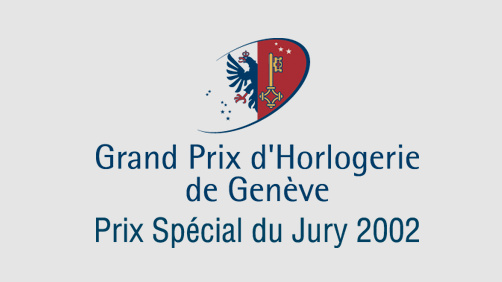
Prix Special du Jury 2002
-
About
THIS MODEL WAS PRODUCED BETWEEN 2008 AND 2014.
THE BOUTIQUE EDITION WITH BLACK DIAL ON 18K 6N GOLD CASE IS AVAILABLE ONLY IN THE F.P.JOURNE BOUTIQUES AND ESPACES AND FOR ALL F.P.JOURNE MODELS, APART FROM THE STRIKING WATCHES.
WORLD PREMIERE:
THE OCTA CALENDRIER IS THE FIRST WRISTWATCH INTEGRATE AN ANNUAL CALENDAR WITH A LARGE DATE, AND TO FEATURE A POWER RESERVE OF MORE THAN 120 HOURS.
THE ANNUAL CALENDAR IS THE THIRD COMPLICATION TO BE INTEGRATED IN THE AUTOMATIC OCTA CALIBRE. A CALIBRE RECOGNIZED AS THE AUTOMATIC MOVEMENT TO FEATURE A POWER RESERVE OF OVER FIVE DAYS WITH A VERY HIGH DEGREE OF PRECISION - EVEN WHEN THE WATCH IS NOT WORN! THE ORIGINALITY OF EACH COMPLICATION IN THE OCTA COLLECTION IS THE IDENTICAL BASEPLATE USED FOR EACH MODEL.
FRANÇOIS-PAUL JOURNE HAS MANAGED TO INTEGRATE A SIZABLE COMPLICATION - A RETROGRADE ANNUAL CALENDAR - WHILE MAINTAINING THE DIMENSIONS OF THE STANDARD MOVEMENT OF ONLY 30MM IN DIAMETER AND 5,7 MM HIGH.
THE ANNUAL CALENDAR INDICATES THE DATE IN TWO WINDOWS AND IT THE DATE ADVANCES AUTOMATICALLY FOR MONTHS WITH 29, 30 AND 31 DAYS. IN NON-LEAP YEARS (THREE YEARS OUT OF FOUR) THE DATE IS ADVANCED MANUALLY FROM THE 28TH TO THE 29TH OF FEBRUARY BY A SIMPLE TURN OF THE CROWN. THE DATE THEN PASSES AUTOMATICALLY FROM FEBRUARY 29 TO MARCH 1. -
Testimony
Calibre OCTA
A horological ideal
“The construction of the Octa calibre has less powerful ties with horological history than do the constant-force device or resonance models, but it symbolises an horological ideal of giving timekeepers the highest possible degree of precision and autonomy!
One can indeed note the fact that if church clocks are placed so high, in addition to enhancing visibility, it was mostly because it often took an entire month for the driving-weights to drop the length of their cords. Numerous systems were invented to increase the operating duration of timekeeping devices, meeting with various degrees of success. Given the small volume of a wristwatch, the size of the mainspring was automatically limited. Watchmakers therefore discovered the trick of adding an extra wheel to the customary geartrain in order to extend the duration of its development. Unfortunately, actually using this system, even with a stronger spring, led them to observe that the level of energy actually reaching the balance remained low. To compensate for this, they fitted a smaller balance using less energy, but which was also less stable. It is therefore not unusual to find that some watches able to run for several days display an extremely unpredictable level of precision.
This challenge was a powerful source of motivation! I then imagined that the best and the most obvious means of extending the running duration would be to extend the capacity of the spring development. The difficulty lay in integrating it on the same level as the gear-train and the escapement, given its stability: 1 metre and 1 millimetre thick. Thanks to the low torque of this spring, I could achieve extremely fast automatic winding (one and a half hours on a Chappuis cyclotest for over 5 days’ running).
Once the challenge of autonomy was thus successfully met with this automatic winding calibre, I knuckled down to the second challenge of managing to insert various complications into that same movement: power reserve with large date display, fly-back chronograph with large date display, retrograde annual calendar, etc… and of doing so while maintaining an identical size for all models in the Octa collection.
Three years of research and development were required before this automatic winding movement that is unique in the world could be presented to the public.”
François-Paul Journe -
Technical description
Technical Specifications
Indications :Off centre hours and minutes
Small seconds at 4:30
Large Central Date
Day in window
Month in windowDimensions :- Overall diameter : 30.80 mm
- Casing-up diameter : 30.40 mm
- Overall height : 5.80 mm
- Height of winding stem : 2.80 mm
- Diameter of stem thread : S0.90mm
Characteristics :In-line lever escapement, 15-tooth wheel
Balance with 4 inertia weights
Flat Anachron microflamed spring
Mobile stud holder
Free-sprung balance
Nivatronic laser-welded to the collet
Pinned GE stud
Three-position crown
Slipping mainspring
Off-centre winding rotorWINDING SPEED :of rotor:
274 clockwise revolutions / 24 hours (without mainspring slipping)Features :Bi-directional automatic winding
Date setting by turning crown in opposite ways (position2)
Time setting with crown in position 3FREQUENCY :21'600 Alt/h, 3 Hz
Balance :Inertia: 10.10 mgcm2
Angle of lift: 52°Amplitude :12 h dial up : 280°
90 h dial up : 220°Autonomy :160 ± 10 hours
Number of jewels :39
Finish :High grade
Circular stripes on the bridges
Baseplate partly circular grained
Gilt engravings
Polished screw heads with chamfered slots
Pegs with polished rounded endsNumber of components :Movement: 241
Cased up with strap: 282Indications :Off centre hours and minutes
Small seconds at 4:30
Large Central Date
Day in window
Month in windowDimensions :- Overall diameter : 30.80 mm
- Casing-up diameter : 30.40 mm
- Overall height : 5.80 mm
- Height of winding stem : 2.80 mm
- Diameter of stem thread : S0.90mm
Characteristics :In-line lever escapement, 15-tooth wheel
Balance with 4 inertia weights
Flat Anachron microflamed spring
Mobile stud holder
Free-sprung balance
Nivatronic laser-welded to the collet
Pinned GE stud
Three-position crown
Slipping mainspring
Off-centre winding rotorWINDING SPEED :of rotor:
274 clockwise revolutions / 24 hours (without mainspring slipping)Features :Bi-directional automatic winding
Date setting by turning crown in opposite ways (position2)
Time setting with crown in position 3FREQUENCY :21'600 Alt/h, 3 Hz
Balance :Inertia: 10.10 mgcm2
Angle of lift: 52°Amplitude :12 h dial up : 280°
90 h dial up : 220°Autonomy :160 ± 10 hours
Number of jewels :39
Finish :High grade
Circular stripes on the bridges
Baseplate partly circular grained
Gilt engravings
Polished screw heads with chamfered slots
Pegs with polished rounded endsNumber of components :Movement: 241
Cased up with strap: 282
At the heart of the movementAt the heart of the movementBrevet - EP 1 760 544 A1Technical description
Watches with long power reserves have hitherto been handicapped by small balances which are susceptible to shocks and disturbances. The Octa's compact construction allows a large (10.1 mm) balance to be fitted, giving greater inertia and stability. The free-sprung chronometer balance is adjusted by five turning weights that vibrate at a steady 21'600 times an hour.
Fully wound, the Octa delivers chronometric precision for 120 hours. The meter-long mainspring supplies an average 850gr of torque, limiting the loss in balance amplitude to 25% over the five-day period. Beyond that time, the watch will continue to go for another day or two, but the amplitude-loss no longer guarantees precision timekeeping.Brevet - EP 1 760 544 A1
Technical description
Watches with long power reserves have hitherto been handicapped by small balances which are susceptible to shocks and disturbances. The Octa's compact construction allows a large (10.1 mm) balance to be fitted, giving greater inertia and stability. The free-sprung chronometer balance is adjusted by five turning weights that vibrate at a steady 21'600 times an hour.
Fully wound, the Octa delivers chronometric precision for 120 hours. The meter-long mainspring supplies an average 850gr of torque, limiting the loss in balance amplitude to 25% over the five-day period. Beyond that time, the watch will continue to go for another day or two, but the amplitude-loss no longer guarantees precision timekeeping.
Technical Specifications
Off centre hours and minutes
Small seconds at 4:30
Large Central Date
Day in window
Month in window
- Overall diameter : 30.80 mm
- Casing-up diameter : 30.40 mm
- Overall height : 5.80 mm
- Height of winding stem : 2.80 mm
- Diameter of stem thread : S0.90mm
In-line lever escapement, 15-tooth wheel
Balance with 4 inertia weights
Flat Anachron microflamed spring
Mobile stud holder
Free-sprung balance
Nivatronic laser-welded to the collet
Pinned GE stud
Three-position crown
Slipping mainspring
Off-centre winding rotor
of rotor:
274 clockwise revolutions / 24 hours (without mainspring slipping)
Bi-directional automatic winding
Date setting by turning crown in opposite ways (position2)
Time setting with crown in position 3
21'600 Alt/h, 3 Hz
Inertia: 10.10 mgcm2
Angle of lift: 52°
12 h dial up : 280°
90 h dial up : 220°
160 ± 10 hours
39
High grade
Circular stripes on the bridges
Baseplate partly circular grained
Gilt engravings
Polished screw heads with chamfered slots
Pegs with polished rounded ends
Movement: 241
Cased up with strap: 282
Off centre hours and minutes
Small seconds at 4:30
Large Central Date
Day in window
Month in window
- Overall diameter : 30.80 mm
- Casing-up diameter : 30.40 mm
- Overall height : 5.80 mm
- Height of winding stem : 2.80 mm
- Diameter of stem thread : S0.90mm
In-line lever escapement, 15-tooth wheel
Balance with 4 inertia weights
Flat Anachron microflamed spring
Mobile stud holder
Free-sprung balance
Nivatronic laser-welded to the collet
Pinned GE stud
Three-position crown
Slipping mainspring
Off-centre winding rotor
of rotor:
274 clockwise revolutions / 24 hours (without mainspring slipping)
Bi-directional automatic winding
Date setting by turning crown in opposite ways (position2)
Time setting with crown in position 3
21'600 Alt/h, 3 Hz
Inertia: 10.10 mgcm2
Angle of lift: 52°
12 h dial up : 280°
90 h dial up : 220°
160 ± 10 hours
39
High grade
Circular stripes on the bridges
Baseplate partly circular grained
Gilt engravings
Polished screw heads with chamfered slots
Pegs with polished rounded ends
Movement: 241
Cased up with strap: 282

Technical description
Watches with long power reserves have hitherto been handicapped by small balances which are susceptible to shocks and disturbances. The Octa's compact construction allows a large (10.1 mm) balance to be fitted, giving greater inertia and stability. The free-sprung chronometer balance is adjusted by five turning weights that vibrate at a steady 21'600 times an hour.
Fully wound, the Octa delivers chronometric precision for 120 hours. The meter-long mainspring supplies an average 850gr of torque, limiting the loss in balance amplitude to 25% over the five-day period. Beyond that time, the watch will continue to go for another day or two, but the amplitude-loss no longer guarantees precision timekeeping.

Technical description
Watches with long power reserves have hitherto been handicapped by small balances which are susceptible to shocks and disturbances. The Octa's compact construction allows a large (10.1 mm) balance to be fitted, giving greater inertia and stability. The free-sprung chronometer balance is adjusted by five turning weights that vibrate at a steady 21'600 times an hour.
Fully wound, the Octa delivers chronometric precision for 120 hours. The meter-long mainspring supplies an average 850gr of torque, limiting the loss in balance amplitude to 25% over the five-day period. Beyond that time, the watch will continue to go for another day or two, but the amplitude-loss no longer guarantees precision timekeeping.

